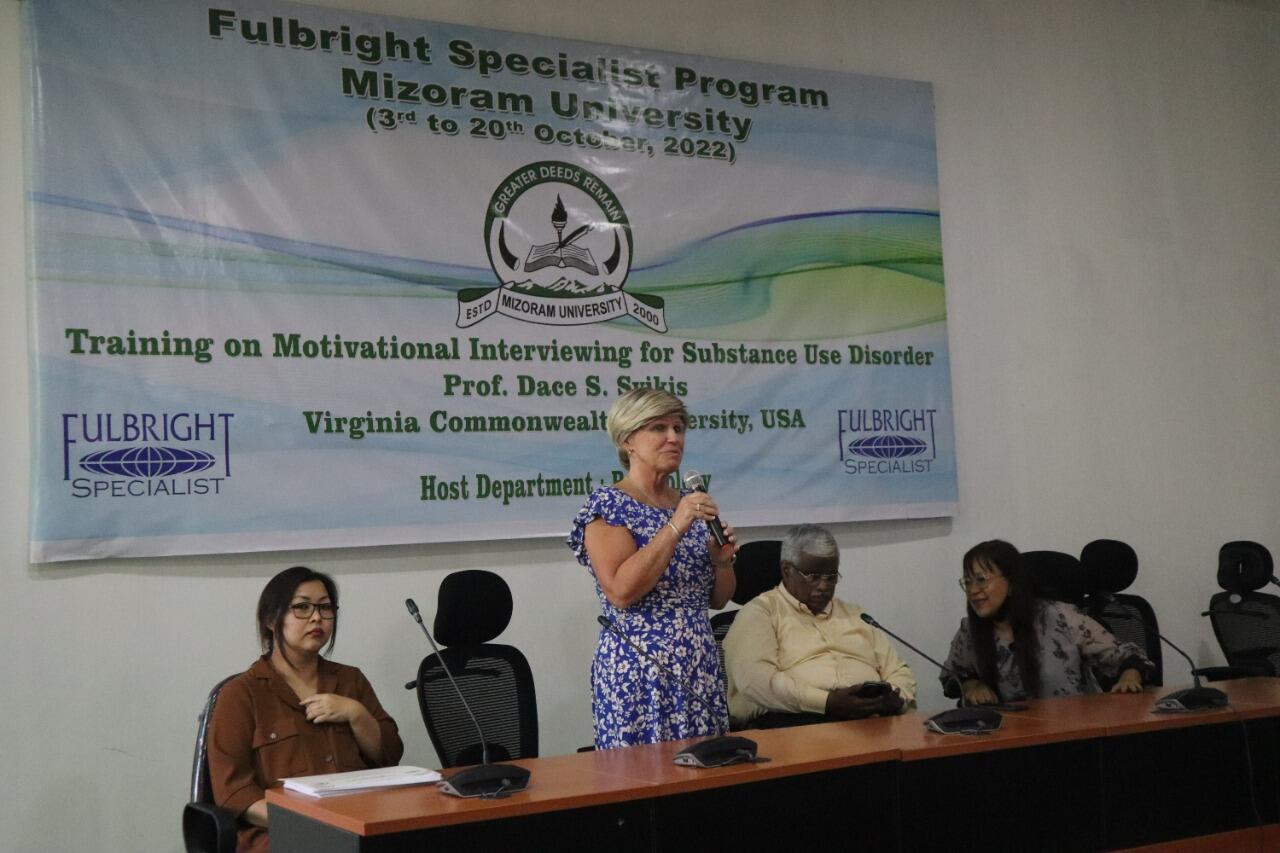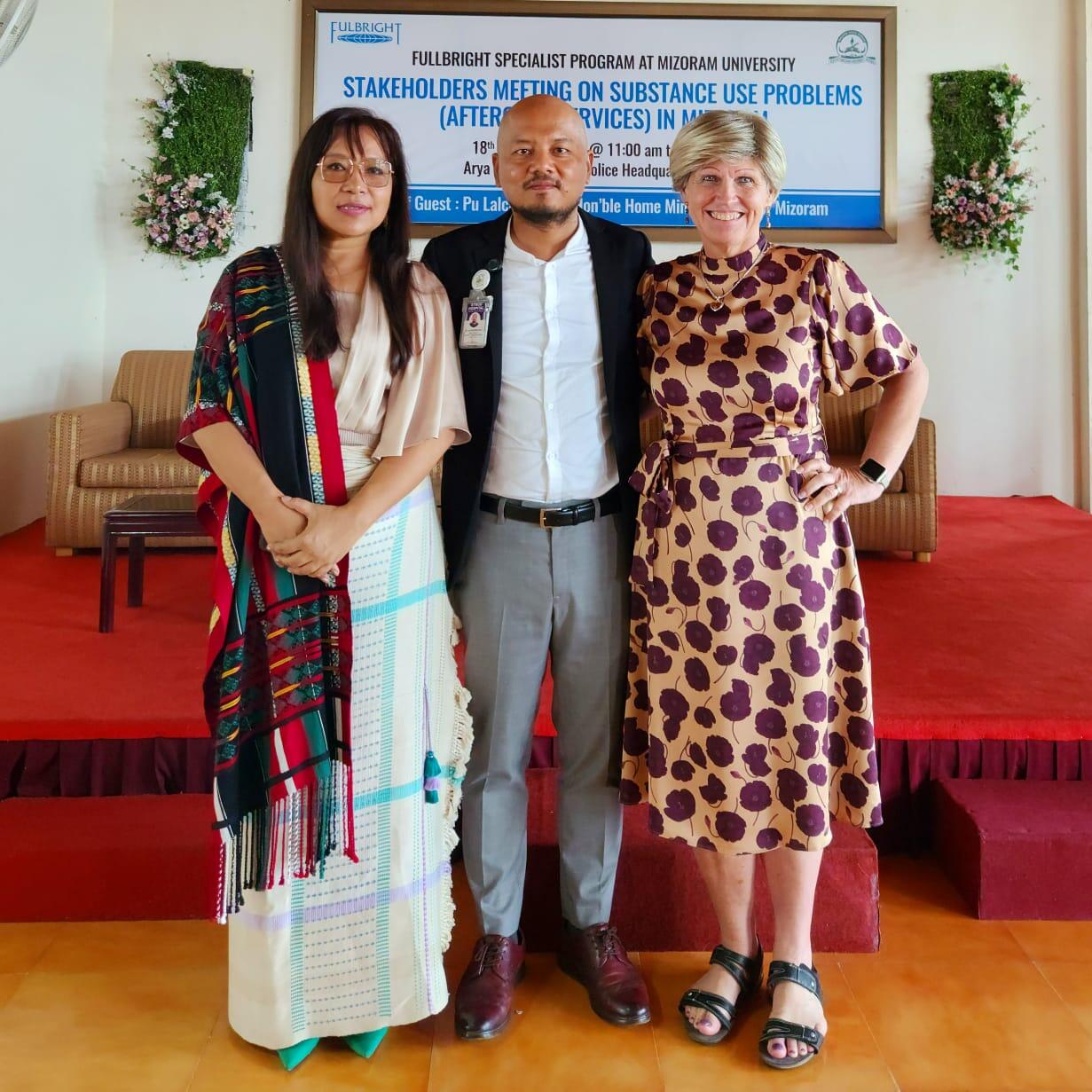
Jan. 9, 2023
VCU professor, Fulbright specialist travels to India to train community leaders on substance use disorder treatment
Share this story
A Virginia Commonwealth University professor provided substance use disorder treatment training for community leaders in Mizoram, India, during a Fulbright Specialist Program experience this fall.
Dace Svikis, Ph.D., a professor of clinical psychology in the Department of Psychology at VCU’s College of Humanities and Sciences, conducted training sessions on motivational interviewing, a form of counseling that encourages individuals to find the internal motivation needed to change a certain behavior. She hopes the international experience, which stemmed from a collaborative effort through a VCU-based fellowship program offered at only 14 U.S. universities, will allow more students and faculty to continue that collaboration.
“This was truly an amazing experience for me, and I am confident I learned as much if not more than the participants during my time in Mizoram,” Svikis said.
The collaboration that led to Svikis’ international project began three years ago with a visiting scholar’s placement in the VCU Department of Psychology as part of the Hubert H. Humphrey Fellowship Program, an international Fulbright exchange program sponsored by the U.S. Department of State’s Bureau of Educational and Cultural Affairs. Mizoram, India-based public health physician Lalchhanhima Ralte, MBBS, came to VCU in 2019-2020 to study innovative substance abuse prevention approaches, their implementation and their impact.

Ralte connected with Svikis, who studies evidence-based interventions for the treatment of alcohol and drug misuse and substance use disorders, while taking two of her courses, Psychological Treatment of Addiction in fall 2019 and Motivational Interviewing in spring 2020.
“Aside from taking her classes, I already knew her as she was very involved with the Humphrey fellows at VCU. She was like a mentor to me at that stage, as my core interest was in substance abuse and counseling techniques,” Ralte said. “Attending Dace’s Motivational Interviewing class evoked in me the need to teach motivational interviewing back home among the counselors and mental health doctors working in the field of substance use disorders.”
When Ralte returned to India, he invited Svikis to visit and collaborate with him and his colleagues at Mizoram University to train members of their community, but the pandemic delayed the pair’s plans. In October, Svikis, who also serves as deputy director of the VCU Institute for Women's Health and director of the AWHARE Program (Addiction and Women's Health: Advancing Research and Evaluation), finally made the trip.
Their project, Svikis said, focused on “kindling a shift in culture away from the confrontational approach still used in many programs and countries around the world, to one that embodies motivational interviewing’s spirit, recognizing ambivalence as a normal part of behavior change and treating individuals with substance misuse with respect, empathy and compassion.”
While in Mizoram, Svikis gave the keynote address at a two-day international seminar, “Make Mental Health a Global Priority,” organized by the Department of Psychology at Mizoram University. She shared with attendees the latest research on substance use disorder as a chronic relapsing disorder and evidence-based treatments, including motivational interviewing.
“Motivational interviewing is a person-centered approach that treats individuals with respect,” said Svikis, also a professor in the Department of Psychiatry and the Department of Obstetrics and Gynecology at the VCU School of Medicine. “It contrasts sharply with more traditional, confrontational approaches to substance use disorder treatment. Instead, the spirit of motivational interviewing sets a nonjudgmental tone for a therapeutic session, with a focus on empathy — understanding the situation through a client’s eyes — and patient autonomy — recognition that only the client can make the decision to stop or reduce substance use.”
Svikis and her hosts — Ralte and ?H.K. Laldinpuii Fente, a professor of psychology at Mizoram University and Fulbright alumna who studied at Princeton University — adapted training sessions on motivational interviewing to fit with Mizo culture in preparation for an educational intensive for community leaders in the city of Aizawl. Over five days, they trained local leaders in psychology, law enforcement, social work, health care, community and faith-based groups and other fields on best practices to implement motivational interviewing and other person-centered measures for substance use disorder treatment. At the end of the training, the group came up with a plan for how they could establish and maintain a community-focused approach to relapse prevention in Aizawl.
“There is so much value in bringing all relevant parties to the table when you are working on creating a culture shift,” Svikis said. “I witnessed firsthand the value of community involvement throughout the project — from start to finish. It isn’t easy to accomplish, but Drs. Fente and Ralte made that their No. 1 priority because they recognized the importance of having all agencies involved.”
Svikis encouraged students and faculty to seek out and take advantage of educational opportunities abroad.

“During my three weeks in Aizawl, Mizoram, I learned so much about the Mizo people and their culture,” Svikis said. “I was particularly awed by their strong sense of family and community. For example, there are no nursing homes in Aizawl because there is no need for them. Every individual knows they will be taken care of when they get older — if not by family members, then by others in the community. Within that framework, the model Drs. Ralte and Fente designed for motivational interviewing implementation, with a focus on community-based involvement and support for relapse prevention, offers great promise.”
Ralte noted the importance of the Humphrey Fellowship, which has made a difference in his career, as a catalyst for this project, which has made a difference in the Mizoram community.
“One of the objectives of the U.S. Department of State’s Fulbright Humphrey Fellowship program is to foster a continuous relationship between the U.S. and other countries — the USA and India, in our case — and this was fulfilled through this project,” Ralte said. “I think it was an excellent time of learning for the participants from a motivational interviewing expert during the workshop. It was also an opportunity for Dace to showcase how counseling/psychotherapy is done in the U.S., which was something that changed my perspective during my time at VCU.”
And the connection is one their team plans to continue to foster, Svikis said.
“Drs. Ralte, Fente and I hope we can establish an ongoing collaboration between Mizo University and VCU, with opportunities for students to learn from one another and benefit through a broader understanding of public health and societal issues while gaining greater respect for and better understanding of different cultures,” Svikis said.
Subscribe to VCU News
Subscribe to VCU News at newsletter.vcu.edu and receive a selection of stories, videos, photos, news clips and event listings in your inbox.










